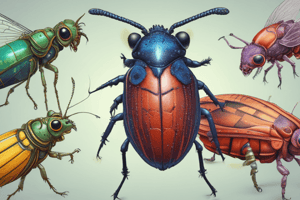Podcast
Questions and Answers
What is the difference between ectoparasites and endoparasites?
What is the difference between ectoparasites and endoparasites?
- Ectoparasites are facultative parasites but endoparasites are obligate parasites.
- Ectoparasites live on the outer surface of the host while endoparasites live inside the host's body. (correct)
- Ectoparasites cause severe diseases but endoparasites do not cause any harm.
- Ectoparasites are always pathogenic while endoparasites are non-pathogenic.
Which type of parasite is entirely dependent on the host during a segment or all of its life cycle?
Which type of parasite is entirely dependent on the host during a segment or all of its life cycle?
- Accidental parasite
- Erratic parasite
- Facultative parasite
- Obligate parasite (correct)
What distinguishes accidental parasites from other types of parasites?
What distinguishes accidental parasites from other types of parasites?
- They exhibit both parasitic and non-parasitic modes of living.
- They cause severe diseases.
- They are entirely dependent on the host.
- They attack unnatural hosts and survive. (correct)
Which type of parasite can adapt to a parasitic way of life but is not entirely dependent on it?
Which type of parasite can adapt to a parasitic way of life but is not entirely dependent on it?
What characterizes an erratic parasite?
What characterizes an erratic parasite?
Why is understanding opportunistic parasites gaining importance?
Why is understanding opportunistic parasites gaining importance?
What type of host is a host that undergoes a sexual method of reproduction for the parasite?
What type of host is a host that undergoes a sexual method of reproduction for the parasite?
Which type of host serves as a temporary refuge and vehicle for reaching an obligatory host, usually the definitive host?
Which type of host serves as a temporary refuge and vehicle for reaching an obligatory host, usually the definitive host?
What type of symbiotic relationship exists when both partners are metabolically dependent upon each other?
What type of symbiotic relationship exists when both partners are metabolically dependent upon each other?
In which symbiotic relationship does one partner benefit without causing harm to the other?
In which symbiotic relationship does one partner benefit without causing harm to the other?
Which type of host makes the parasite available for transmission to another host and is usually not affected by the infection?
Which type of host makes the parasite available for transmission to another host and is usually not affected by the infection?
What kind of organism is considered a symbiont if it spends a portion or all of its life cycle intimately associated with another organism of a different species?
What kind of organism is considered a symbiont if it spends a portion or all of its life cycle intimately associated with another organism of a different species?
Flashcards are hidden until you start studying
Study Notes
Ectoparasites vs. Endoparasites
- Ectoparasites live on the surface of a host, while endoparasites live inside the host's body.
- Endoparasites can cause more severe damage due to their intimate association with host tissues.
Dependency on Host
- Obligate parasites are entirely dependent on their host for survival during a segment or all of their life cycle.
Accidental Parasites
- Accidental parasites are organisms that invade hosts other than their normal hosts, often leading to unpredictable consequences.
Facultative Parasites
- Facultative parasites can adapt to a parasitic lifestyle but are not entirely dependent on it; they can live independently in the environment.
Erratic Parasites
- Erratic parasites are those that wander from their usual site of infection, often leading to unusual sites in the host's body.
Importance of Opportunistic Parasites
- Understanding opportunistic parasites is crucial due to their potential to exploit weakened host defenses and cause disease under certain conditions.
Definitive Host
- A definitive host is one where the parasite undergoes sexual reproduction, completing its life cycle.
Transport Host
- A transport host, or paratenic host, provides a temporary refuge and serves as a vehicle to reach the definitive host.
Mutualistic Relationship
- In a mutualistic symbiotic relationship, both partners are metabolically dependent on each other for survival and benefits.
Commensal Relationship
- In a commensal relationship, one partner benefits while the other is not significantly harmed or helped.
Reservoir Host
- A reservoir host makes the parasite available for transmission to another host, typically without suffering from the infection.
Symbiont
- A symbiont is an organism that spends a portion or all of its life cycle attached to or intimately associated with a different species.
Studying That Suits You
Use AI to generate personalized quizzes and flashcards to suit your learning preferences.




